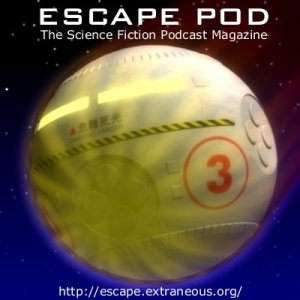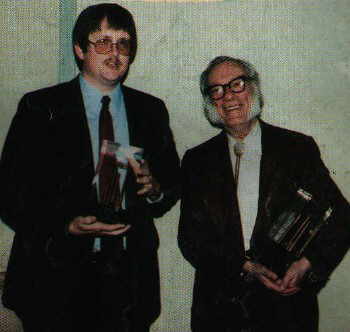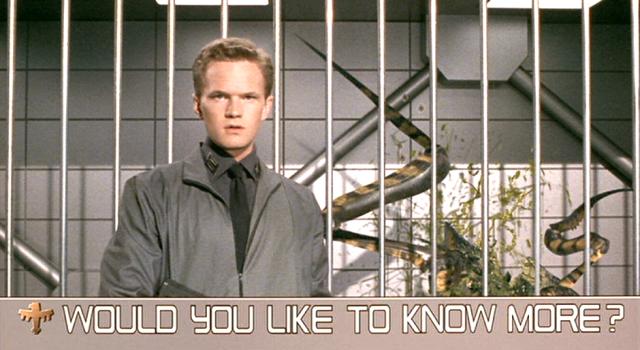Book Review: Ender's Game by Orson Scott Card
It’s been over twenty years since Orson Scott Card’s science-fiction classic Ender’s Game was first published, but the novel has been on my “been meaning to read” list for almost as long. Interestingly, however, though I am about to regail you with a brief review of it (and promise me you won’t stop reading until I explain what I mean), I still haven’t actually read the book.
BACKGROUND
It all started when my brother realized he didn’t like his brand-new Apple I-Phone. Instead of sending it back, he sold it to my mother, who in turn called me and offered it to me free of charge. I, not being one to give up a free toy, said I would love the I-Phone, though I have never owned an I-Pod and was relatively happy with my archaic, five year old cell phone.
 | | Maybe it was the host's insistence (both blatant and possibly subliminal) that I blog about it, but I feel the need to plug Escape Pod, the finest audio science-fiction podcast |
Of course, in order to activate my I-Phone, I had to install I-Tunes, the gateway to my newfound addiction: podcasts. I’d listened to podcasts before this, mostly incredibly geeky ones like MuggleCast or The Lost Initiative, but never had I had access to so many different types of podcasts and never had I had the ability to transfer them to a portable device, take that device to work, and listen to them while working. It definitely makes work more enjoyable.
In the beginning, I only downloaded podcasts related to the best television show on the air now, Lost, but that quickly got old, especially after the show began its current hiatus, so I branched out, grabbing video game and movie related pods, NPR’s “Wait, Wait, Don’t Tell Me” (possibly the funniest news show you’ll ever find), educational pods containing lectures by people like Oliver Sachs, cheesy old sci-fi radio plays, and two podcasts—Escape Pod and Pseudopod—containing surprisingly well-made weekly readings of contemporary short fiction. It was through the latter that I first heard about Audible, a website where you can buy audiobooks and upload them to I-Tunes.
Through certain promotions, I got my first audiobook for free, and the one I chose was, naturally, Ender’s Game, the 20th anniversary edition, unabridged with a postscript by the author. It is in that postscript that Card explains his feelings on the subject of audio fiction, and he even tells us that the audio version of Ender’s Game is the best way to experience the novel. Therefore, I feel no guilt in reviewing a book that I’ve only had read to me, since the author himself has, in a round about and impersonal sort of way, given me his blessing.
 | | Orson Scott Card: Happy Geek |
PLOT SUMMARY
Andrew “Ender” Wiggin was chosen, before he was even conceived, as a candidate to save the human race. Aliens known as “buggers” have attacked mankind twice already, and it is doubtful that humanity will survive a third invasion. For this reason, Ender Wiggin was bred to be a military genius, as ruthless and as simultaneously compassionate as he needs to be, far more intelligent than most kids, driven enough to push through any obstacles thrown at him, and young enough to give orders without doubt or regret.
He is watched carefully throughout his early life, and then he is sent to battle school, a space station containing a zero-gravity chamber where kids don battle suits and learn the ins and outs of space combat, troop formations, and military strategy. Ender excells at battle school, even after he is given progressively more intense disadvantages by his teachers and the military leaders behind the scenes. They test him and mold him into the perfect soldier, and eventually they ask him to save them all from the buggers.
REVIEW
Ender’s Game is a stunningly well written novel. Orson Scott Card is an obvious fan of the invisible narrator, using a simple style with few flourishes in his exposition, but switching to masterful—almost poetic—prose in the dialogue. This is most apparent towards the end of the novel, with Ender’s final teacher, whose dialogue drips with ironic wisdom that lacks any hint of cliché.
 | | Here we see a younger, geekier, and slightly more overweight Orson Scott Card, standing next to Sir Isaac Asimov, both of whom are holding their Nebula awards--Mr. Card clearly does not need me to tell him how awesome he is |
Beyond that, of course, it is an amazing story. Since the main characters of the novel are young boys, it’s a story that could easily appeal to a younger audience, but the themes and ideas explored throughout are harrowingly adult. A modern reader will see some pretty creepy parallels to current events (a mode of thought which, if explored, will take you down quite different paths than modern allegorical fiction does), but I think that speaks more to the timelessness of Card’s concepts than any foresight he might have had into the early twenty-first century. Additionally, a modern reader with even a passing interest in contemporary science-fiction will see how Ender’s Game has influenced the genre.
Of course, you don’t need me to tell you it’s a masterful piece of work. It won the Hugo and Nebula Award—which is in itself an amazing achievement—and has become required reading not only in K-12 schools throughout this country, but also in universities and other schools across the world, even in places like the Marine Corps University at Quantico.
From a psychological standpoint, the novel displays an intimate knowledge of the human condition and what it takes to be a leader, but it’s also the much simpler story of a young boy growing up, making friends and fighting bullies. It’s a science-fiction epic about an genocidal interstellar war with an alien race, but it’s also a story of family ties and sibling rivalry.
In short, Ender’s Game is one of the best science-fiction books of all time, and also one of the best works of literature I’ve never read.
ENDER'S GAME: THE MOVIE?
In Orson Scott Card's aforementioned postscript, he spends a great deal of time talking about the challenges of turning Ender's Game into a major motion picture, and I felt the need to put in my two cents on the subject.
For one thing, not all good fiction needs to be made into film, and I fear that it would be impossible to make Ender's Game translate correctly. Not only does the cast necessarily depend on multiple good young actors (and we're talking very young), but it also heavily depends on training simulators and video game technology, two things that have never translated well to film. Additionally, the battle room sequences, which make up the bulk of the story, absolutely require zero-gravity, which is expensive when done right and terrible when done wrong. The other special effects, namely the record of space battles, the buggers, etc., aren't too hard to do, but when tacked on to the expense of an already expensive movie, we're talking a summer blockbuster. I doubt any studio will sign off on such an expensive project when it banks on the acting skills of prepubescent boys, especially when there's no romantic subplot involved.
 | | Be careful what you wish for... |
However, even if a studio gets somehow sold on it, Ender's Game, as a movie, is as doomed as the human race is in the story. It would take an exceptional filmmaker to pull it off, and we haven't yet started breeding filmmakers and training them in harrowing film schools where we force them to make historical epics starring Dane Cook and Sandra Bullock.
I'm not saying it's impossible, and Card's enthusiasm for the project is at least a little contagious, but to say I am worried about the movie is an understatement. At least Card wrote the screenplay, and at least he maintained enough creative control to force them to keep to certain standards, but there are still too many obstacles to overcome to make this thing work. I hope I'm wrong in foretelling it, but I think an Ender's Game movie will be as disastrous as the film versions of Battlefield Earth or Starship Troopers. So please, before such a travesty transpires, make the book—or even the audiobook—a priority, assuming you haven't already read it.
-e. magill 04/07/2008
|
|